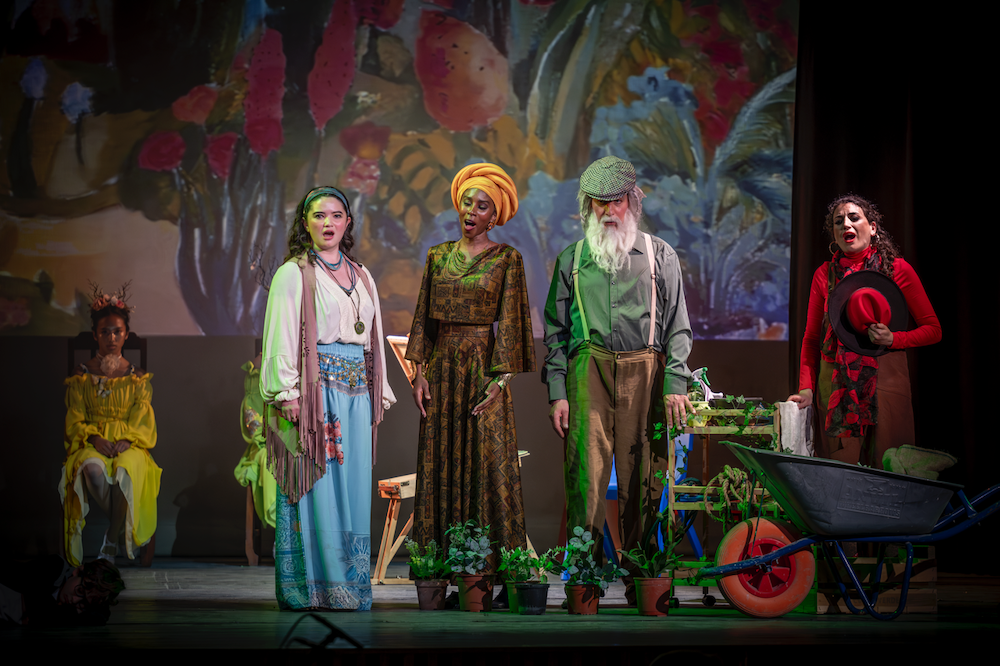On the Maltese islands, the principal venues for full-scale opera are the Astra and Aurora opera houses on Gozo. While Valletta can pride itself on the exquisite 18th century Teatro Manoel, the city’s grand 1860s opera house never recovered from severe bombardment in World War II. Its ruins now frame an outdoor performance space designed by Renzo Piano. The location for the premiere of TRAB: The Rest is Dust was the 1000-seat St Agatha’s Auditorium in Rabat, just outside the fortified city of Mdina, some 20 minutes’ drive from Valletta.
TRAB is the final instalment of an ambitious operatic trilogy by the 51-year-old Maltese composer Reuben Pace. The first instalment, SWAR: Behind the Fortifications – set in 1565, when Malta was besieged by the Ottomans – was staged in Valletta in 2018. It was followed in 2022 by BLAT: The Island Fortress, a World War II story; having taken shape when Malta was besieged by Covid, it came into being as a film. The libretto for TRAB (the word means ‘dust’ in Maltese) is by the distinguished writer and poet Ġorġ Peresso, also Pace’s collaborator for SWAR. While it contains the occasional line in English, the text is in Maltese, a resonant language with roots in Arabic and a substantial Latin component.
If the new opera’s two predecessors dealt explicitly with the theme of war, the present-day conflict in TRAB is between big business and the environment: the aspirations of Rocco, a rapacious property developer, threaten the Eden-like habitat of the mystical Lord of the Garden. (It is surely no coincidence that the conurbation around Valletta is bristling with cranes.) In the production by British director Michael Moxham, urban or sylvan landscapes were evoked in static and animated projections of artwork created by students at the Mikiel Anton Vassalli College, which specialises in the visual and performing arts and acted as the producing company for TRAB. The action involves a large cast – drawn for the premiere from Malta, the UK, Germany and France, and including a chorus of children – and takes place more on the level of archetypes and symbolism than realism. This does not preclude clear definition of the main characters in both their words (there were surtitles in English) and music, which called on the forces of the Maxime Orchestra and its founding conductor Andrzej Mandryka, visiting from the Polish city of Katowice.

A sardonic, Weimar-Republic air pervades the declamatory, sometimes jazz-infused expression of the forces of capitalism – Rocco (the commanding, Mephistophelian bass-baritone Andrew Louis Cassar) and his henchman Sonny (the thrusting tenor Steffen Schantz). There is even a distorted reference to the big tune in Swan Lake when Tchaikovsky’s name is mentioned in the libretto. Aligning himself with Rocco is Ernest, a university professor tempted by the prospect of a new campus. His vocal lines are more sustained and the tenor Charles Vincenti spun them with Italianate poise. The orchestral writing becomes more densely woven, less spiky, in the scenes in the Garden, its colours often sombre as harmonies hover on the edges of tonality. The Lord of the Garden (the sonorous bass-baritone Gheorghe Palcu) sings a noble aria in praise of art, while Ernest’s idealistic daughter – significantly named Gaia – and her South African partner Prue present Pace with opportunities for lyrical expansion; these were duly seized by the sopranos Camilla Saba Davies and Olivia le Roux, the former projecting with arresting precision and spirit, the latter vibrant and sensuous. The other denizen of the Garden is Carmen, a painter, sung by Clare Ghigo, her svelte mezzo moulding itself to the character’s melismatic idiom. In addition to these human figures there is a quartet of singers representing the seasons. Allotted complex, even knotty part-writing, they were led in gleaming style by the soprano Frances Catherine Farrugia.
The most powerful moment in the entire opera comes towards the end of Act 1 when all the forces join in an ensemble. It is crowned by chants from the children, who in Moxham’s staging made a dramatic entrance from the rear of the auditorium, bearing placards in protest against Rocco’s plans. Act 2 becomes more abstract, almost like a masque. By its end, Rocco wants to think he has triumphed, but in the opera’s final, silent moments a small boy picks up a handful of dirt from the ground, walks over to businessman, seated at the side of the stage, and throws it disdainfully over him.
Though it has elements of a ‘community opera’, Peresso and Pace have not written a piece that compromises itself for the sake of accessibility. It is not ‘easy-going’: both libretto and music carry weight and demand concentration from the listener. In his programme note, Pace wrote: “Although this marks the conclusion of the opera cycle, it is by no means the end of my operatic endeavours.” He should certainly look for further opportunities to cultivate his gifts for serious-minded lyricism and for crafting a dramatic large-scale ensemble. We need more of both in contemporary opera.
Yehuda Shapiro
TRAB: The Rest is Dust
Music composed by Reuben Pace
Libretto by Ġorġ Peresso
Cast and production staff:
Rocco – Andrew Louis Cassar; Sonny – Steffen Schantz; Ernest – Charles Vincenti; Lord of the Garden – Gheorghe Palcu; Carmen – Clare Ghigo; Gaia – Camilla Saba Davies; Prue – Olivia le Roux; Four Seasons – Frances Catherine Farrugia, Daphne Camilleri, Ray Mangion, Roland Veila
Director – Michael Moxham; Set design – Roderick Camilleri, Students of the MAVC Malta School of Art; Lighting – Kevin Zerafa; Executive Producer – Victor Galea, Mikiel Anton Vassalli College
Conductor – Andrzej Mandryka, Maxime Orchestra; Students of MAVC; Choir Master – Geoffrey Thomas; SoM Young Singers, MAVC, Malta School of Music
St Agatha’s Auditorium, Rabat, Malta, 25 April 2025
Photos: © Vince Piscopo